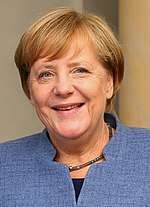Fourth Merkel cabinet
The fourth Merkel cabinet (German: Kabinett Merkel IV) is the 24th and current Government of the Federal Republic of Germany, sworn in on 14 March 2018 after Angela Merkel was proposed as Chancellor by President Frank-Walter Steinmeier and elected by the Bundestag on the first ballot.[1]
| Fourth Merkel cabinet | |
|---|---|
24th Cabinet of Germany | |
| 2018–present | |
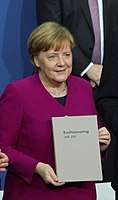 | |
| Date formed | 14 March 2018 |
| People and organisations | |
| Head of state | Frank-Walter Steinmeier |
| Head of government | Angela Merkel |
| Member party | Christian Democratic Union Social Democratic Party Christian Social Union in Bavaria |
| Status in legislature | Grand coalition |
| Opposition party | Alternative for Germany Free Democratic Party The Left The Greens |
| Opposition leader | Alice Weidel Alexander Gauland |
| History | |
| Election(s) | 2017 federal election |
| Legislature term(s) | 19th Bundestag |
| Predecessor | Merkel III |
The government is supported by a coalition of the Christian Democratic Union (CDU), the Christian Social Union of Bavaria (CSU), and the Social Democrats (SPD),[2] as was its immediate predecessor.
Composition
The cabinet consists of Chancellor Angela Merkel and fifteen Federal Ministers. Fourteen ministers head a department, one member of the cabinet, the Chief of Staff of the Chancellery, will be a Federal Minister for Special Affairs without a portfolio. CDU has 7 positions, SPD has 6, and CSU has 3, as follows:
| Protocol order[3] | Office | Image | Incumbent | Party | In office | Parliamentary State Secretaries[lower-alpha 1] Particular field of responsibilities (where applicable) | |
|---|---|---|---|---|---|---|---|
| 1 |  Chancellor of Germany |
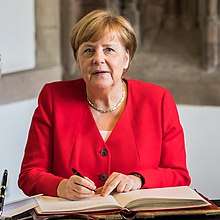 |
Angela Merkel | CDU | 22 November 2005 – present | Annette Widmann-Mauz (StMin) Migrants, Refugees and Integration Monika Grütters (StMin) Culture and Media Hendrik Hoppenstedt (StMin) Cooperation between federation and states Dorothee Bär (StMin) Digitalization | |
| 2 |  Vice Chancellor of Germany  Federal Minister of Finance |
 |
Olaf Scholz | SPD | 14 March 2018 – present | Bettina Hagedorn Christine Lambrecht (2018–2019) Sarah Ryglewski (since 2019) | |
| 3 |  Federal Minister of the Interior, Building and Community |
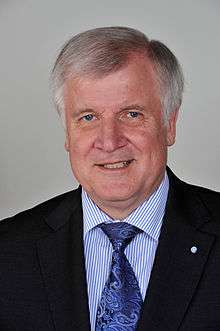 |
Horst Seehofer | CSU | 14 March 2018 – present | Günter Krings Stephan Mayer Marco Wanderwitz | |
| 4 |  Federal Minister for Foreign Affairs |
.jpg) |
Heiko Maas | SPD | 14 March 2018 – present | Niels Annen (StMin) Michelle Müntefering (StMin) Culture Michael Roth (StMin) European affairs | |
| 5 |  Federal Minister of Economics and Energy |
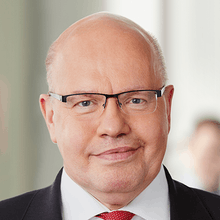 |
Peter Altmaier | CDU | 14 March 2018 – present | Thomas Bareiß Christian Hirte East German affairs Oliver Wittke (2018–2019) Elisabeth Winkelmeier-Becker (since 2019) | |
| 6 |  Federal Minister of Justice and Consumer Protection |
 |
Katarina Barley | SPD | 14 March 2018 – 27 June 2019 | Rita Hagl-Kehl Christian Lange | |
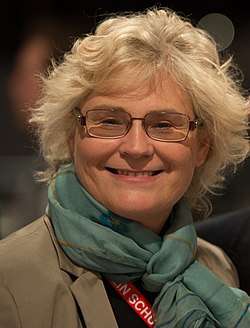 |
Christine Lambrecht | 27 June 2019 – present | |||||
| 7 |  Federal Minister of Labour and Social Affairs |
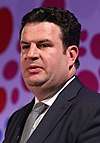 |
Hubertus Heil | SPD | 14 March 2018 – present | Anette Kramme Kerstin Griese | |
| 8 |  Federal Minister of Defence |
.jpg) |
Ursula von der Leyen | CDU | 17 December 2013 – 17 July 2019 | Thomas Silberhorn Peter Tauber | |
.jpg) |
Annegret Kramp-Karrenbauer | 17 July 2019 – present | |||||
| 9 |  Federal Minister of Food and Agriculture |
 |
Julia Klöckner | CDU | 14 March 2018 – present | Hans-Joachim Fuchtel Michael Stübgen (2018–2019) Uwe Feiler (since 2019) | |
| 10 |  Federal Minister for Family Affairs, Senior Citizens, Women and Youth |
.jpg) |
Franziska Giffey | SPD | 14 March 2018 – present | Caren Marks Stefan Zierke | |
| 11 |  Federal Minister of Health |
 |
Jens Spahn | CDU | 14 March 2018 – present | Thomas Gebhart Sabine Weiss | |
| 12 |  Federal Minister of Transport and Digital Infrastructure |
 |
Andreas Scheuer | CSU | 14 March 2018 – present | Steffen Bilger Enak Ferlemann | |
| 13 |  Federal Minister for the Environment, Nature Conservation and Nuclear Safety |
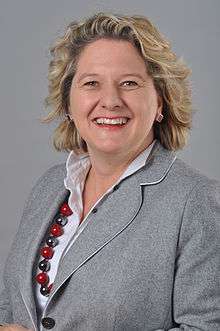 |
Svenja Schulze | SPD | 14 March 2018 – present | Florian Pronold Rita Schwarzelühr-Sutter | |
| 14 |  Federal Minister of Education and Research |
 |
Anja Karliczek | CDU | 14 March 2018 – present | Michael Meister Thomas Rachel | |
| 15 |  Federal Minister for Economic Cooperation and Development |
 |
Gerd Müller | CSU | 17 December 2013 – present | Norbert Barthle Maria Flachsbarth | |
| 16 | Federal Minister for Special Affairs Head of the Chancellery |
 |
Helge Braun | CDU | 14 March 2018 – present | ||
- Parliamentary State Secretaries in the Chancellery and Foreign Office are awarded the honorary title Staatsminister (StMin, transl. Minister of State) in order to underline the importance of their field of responsibilities. This title does not, however, confer upon them any additional powers.
2018 government crisis
In June 2018, a government crisis erupted within the cabinet between Interior Minister and CSU Chairman Horst Seehofer and Chancellor Angela Merkel, after Seehofer had elaborated a masterplan on asylum policies, containing the rejection of asylum seekers already registered in other EU countries.[4] Seehofer threatened to resign over the crisis on 1 July, but an agreement was made between the CDU/CSU sister parties on 2 July.[5]
References
- "Bundestag wählt die Kanzlerin am 14. März" [Bundestag elects the Chancellor on 14 March] (in German). Deutscher Bundestag. Retrieved 9 March 2018.
- based on Artikel 60 III of the Basic Law: – via Wikisource. (full text)
- German Chancellery (15 March 2018). "Liste der Bundesministerinnen und Bundesminister" [List of Federal Ministers]. Protokoll Inland der Bundesregierung (in German). German Federal Ministry of the Interior. Retrieved 16 March 2014.
- German government crisis: What are Merkel's options?, Reuters, 2 July 2018
- Chancellor Angela Merkel and Horst Seehofer agree on a migration compromise, Deutsche Welle, 2 July 2018
